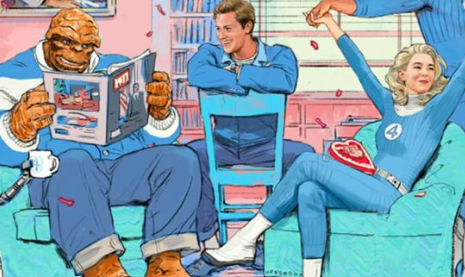We are all hoping they don’t pull another Woke monstrosity here. My fingers are crossed
Once, superhero movies operated as standalone stories, often confined to their unique universes. For decades, iconic characters like Michael Keaton’s Batman and Christopher Reeve’s Superman never crossed paths on the big screen, despite their comic book interactions. This separation persisted due to rights and ownership issues across different studios, which kept characters like Spider-Man from collaborating with other Marvel heroes in cinematic adventures.
This book has different marvel issues in it like Spiderman, fantastic four and captain America.
Sadly i prefer buying comic books where one full story is in it not many different ones. pic.twitter.com/JBX3ndPJ16
— Samuel (@law_goat) June 28, 2024
It wasn’t until Marvel Studios introduced the Marvel Cinematic Universe (MCU) with “The Avengers” in 2012 that the landscape of superhero films was revolutionized. This innovative approach allowed characters to interact across multiple films, creating a web of interconnected stories and deepening character development in ways previously unexplored in cinema. The MCU’s format broke away from the isolated hero concept, presenting a universe where actions in one movie could ripple through to another, enriching the narrative complexity and audience engagement.
The upcoming “Fantastic Four” film by Marvel Studios, however, presents a curious deviation from this established norm. Set to unfold in the 1960s, the film introduces Marvel’s iconic team in an era and setting distinct from the familiar MCU timeline. Kevin Feige, Marvel’s chief, hinted in a podcast that the film would explore a version of the 1960s that diverges from historical accuracy, suggesting an alternate reality that doesn’t align with the traditional New York City known to MCU fans.
Kevin Feige Teases ‘The Fantastic Four’ on the First Episode of ‘The Official Marvel Podcast’
https://t.co/WikF9vRxnU pic.twitter.com/4szju7anMx— Comic Book Outlook (@ComicOutlook) June 28, 2024
This approach isn’t entirely new for Marvel. The franchise has delved into alternate realities with films like “Spider-Man: No Way Home” and “Doctor Strange in the Multiverse of Madness,” and series like “Loki,” which have familiarized audiences with the concept of multiverse adventures. However, the decision to start the Fantastic Four in a universe separate from Earth 616—the primary universe of the MCU that closely mirrors our real world—is a fresh narrative strategy.
The decision to place the Fantastic Four in an alternate 1960s has implications for their integration into the broader MCU. It suggests a potential future where these characters could cross over into the main timeline, interacting with well-known heroes and participating in larger MCU story arcs. Such a move would not only expand the narrative possibilities but also maintain Marvel’s hallmark of interconnected storytelling.
However, Marvel may also choose to keep the Fantastic Four within their unique setting for a longer period, exploring a stylized, altered version of the 1960s that could stand out with its distinct aesthetics and cultural references. This would offer a new flavor to the MCU, mixing retro settings with futuristic superheroics, perhaps presenting an opportunity to explore themes and scenarios that differ markedly from those in other MCU films.
Marvel Studios is close to casting an actor for the role of Doctor Doom in ‘THE FANTASTIC FOUR’. pic.twitter.com/mabx4ar79S
— Nerd Talks (@NerdTalksShow) June 28, 2024
Regardless of the direction Marvel chooses, the introduction of the Fantastic Four in this manner is poised to offer a fresh take on superhero storytelling, blending classic comic book elements with innovative cinematic techniques. I’m just hoping they are not in a Woke Universe where everyone is talking ridiculous Marxist pronouns.
Key Points:
i. Marvel’s new Fantastic Four film is set in the 1960s, but in a universe distinctly different from the established Marvel Cinematic Universe (MCU).
ii. The setting features an altered New York Cityscape that doesn’t match historical or current versions, suggesting a unique alternate reality.
iii. This approach continues Marvel’s exploration of alternate realities seen in films like Spider-Man: No Way Home and Doctor Strange in the Multiverse of Madness.
iv. The film could potentially integrate the Fantastic Four into the main MCU timeline, continuing Marvel’s trend of interconnected superhero narratives.
v. The choice to start the Fantastic Four in a different universe is a fresh twist, emphasizing Marvel’s strategy of creating a complex, interconnected multiverse.
Conner T – Reprinted with permission of Whatfinger News



